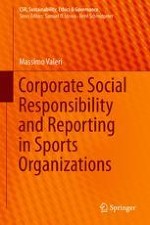2019 | OriginalPaper | Buchkapitel
4. Social Responsibility and Sport: The Political Initiatives
verfasst von : Massimo Valeri
Erschienen in: Corporate Social Responsibility and Reporting in Sports Organizations
Aktivieren Sie unsere intelligente Suche, um passende Fachinhalte oder Patente zu finden.
Wählen Sie Textabschnitte aus um mit Künstlicher Intelligenz passenden Patente zu finden. powered by
Markieren Sie Textabschnitte, um KI-gestützt weitere passende Inhalte zu finden. powered by
